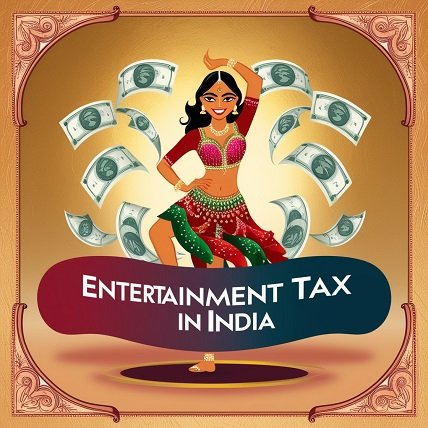Introduction
In India, the entertainment sector is huge and vibrant, with everything from Bollywood films and cricket matches to theater plays and concerts. It is not surprising that this sector is subject to various forms of taxation given its importance in the nation’s cultural and economic fabric. State governments impose taxes on many activities related to entertainment, one of which is the entertainment tax in india.
What is Entertainment Tax?
A tax known as the entertainment tax in india is imposed on a variety of entertainment activities, including as amusement parks, theatrical shows, and movie theaters. The entertainment tax is mostly a state matter in India, which means that each state is free to establish its own regulations and rates, in contrast to other taxes that might be more consistent throughout the nation. This tax may be imposed in a number of ways, such as a percentage of the ticket price or a fixed sum per ticket.
An Overview of India’s Entertainment Tax History
The British implemented the tax during the colonial era in India with the intention of making money from public entertainment. This is when the idea of an entertainment tax first emerged. State governments continued to rely on the levy as a source of income after independence. The tax has changed multiple times over the years to accommodate changing consumer tastes and the entertainment sector.
The Application of Entertainment Tax
Depending on the state, different rules apply to the entertainment tax. As an example, certain states charge a set cost for each ticket, whereas other states may charge a portion of the ticket price. The kind of entertainment—movies, sports, or live performances—can also affect the tax rates. Additionally, the way the tax is applied to various event types and locations may vary.
State Governments’ Role
Since entertainment tax is a state matter, the Indian state governments are able to enact and enforce their own tax laws. Because of this decentralization, laws and tax rates might differ greatly between states. State governments finance local infrastructure, public services, and cultural activities using the money they receive from the entertainment tax.
Effects on the Motion Picture Industry
The entertainment tax has had a major effect on the film industry, especially Bollywood. The tax raises the price of cinema tickets, which may have an impact on consumer spending and box office receipts. Furthermore, differences in state tax rates may result in discrepancies in the box office success of movies. This scenario underwent some modifications with the implementation of the Goods and Services Tax (GST) in 2017, but the entertainment tax still has an impact.
Effects on Other Entertainment Industries
The entertainment tax has an impact on a variety of industries, including live music, sports, and theme parks. Tickets for concerts and cricket matches, for example, are subject to entertainment tax, which may have an impact on attendance and ticket prices. The expense of this tax must also be considered by theme parks and amusement parks, which will affect their pricing policies and bottom lines.
The Effects of the GST Transition
The Goods and Services Tax (GST), which was implemented by the Indian government in 2017, attempted to streamline the tax structure by supplanting numerous state and central levies with a single, cohesive levy. The GST replaced the entertainment tax, which resulted in a major revision to the way services connected to entertainment tax in india. The goal of this change was to make taxes easier to understand and lessen the variety of tax laws that exist in different states.
Conclusion
A vital part of India’s tax structure, entertainment tax in india reflects the varied and dispersed character of the nation’s tax structure. State governments rely heavily on it for revenue, but firms and consumers face difficulties and problems as well. Although there have been some improvements with the switch to the GST, the entertainment tax is still a significant factor for the sector.
FAQ
Read more about: mitsuri.net
What distinguishes GST from entertainment tax in india?
While the GST is a single tax system designed to replace and simplify many state and federal taxes, the entertainment tax was a state-level tax on entertainment activities. The entertainment tax has been included into a larger tax system under the GST.
How does the entertainment tax differ in India’s various states?
States might differ greatly in how the entertainment tax is applied and at what rate. Different tax rates and collection strategies may result from each state’s ability to determine its own laws and regulations.
Does GST take the place of entertainment tax entirely?
Even though the GST has mostly replaced the entertainment tax, there may still be some state-level differences. There are now new tax rates and guidelines for many forms of entertainment activity under the GST framework.

